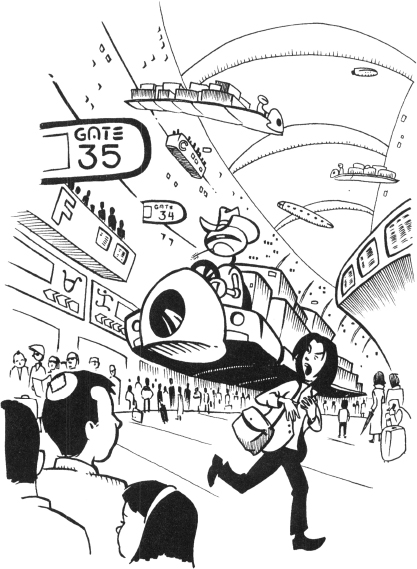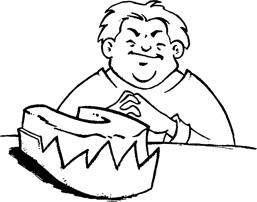Trapped!: The 2031 Journal of Otis Fitzmorgan
Read Trapped!: The 2031 Journal of Otis Fitzmorgan Online
Authors: Bill Doyle


The Inspector
photos:
p. 1/NASA Marshall Space Flight Center (NASA-MSFC)
;
p. 2NASA Headquarters—Greatest Images of NASA (NASA-HQ-GRIN)
,
Ablestock
,
Medioimages/PunchStock
;
p. 3 Ablestock
,
© Royalty-Free/Corbis
;
p. 4 Drew
Hallowell/Icon SMI/Newscom
,
Colin Anderson/PictureQuest
,
Ablestock
Text copyright © 2006 by Bill Doyle
Compilation, illustrations, and design copyright © 2006 by Nancy Hall, Inc.
Crime Through Time is a trademark of Nancy Hall, Inc.
Developed by Nancy Hall, Inc.
All rights reserved.
Little, Brown and Company
Hachette Book Group
237 Park Avenue
New York, NY 10017
Visit our website at
www.HachetteBookGroup.com
First eBook Edition: September 2009
ISBN: 978-0-316-08458-1
CONTENTS
JANUARY 1, 2031: Day 1 of 6 11:45 PM
JANUARY 2, 2031: Day 2 of 6 12:35 PM
JANUARY 2, 2031: Day 2 of 6 6:45 PM
JANUARY 3, 2031: Day 3 of 6 7:30 PM
JANUARY 4, 2031: Day 4 of 6 11:20 AM
JANUARY 4, 2031: Day 4 of 6 5:20 PM
JANUARY 5, 2031: Day 5 of 6 10:50 AM
JANUARY 6, 2031: Day 6 of 6 1:50 PM
JANUARY 6, 2031: Day 6 of 6 4:30 PM
JANUARY 6, 2031: Day 6 of 6 7:30 PM
A thank-you of historic proportions to Nancy Hall for making this book and the Crime Through Time series a reality. To Kirsten
Hall for her insightful grasp of the overall picture, to Linda Falken for her skillful editing and amazing eagle-eye for detail,
and to Atif Toor for bringing the books alive visually.
Special thanks to the editors at Little, Brown: Andrea Spooner, Jennifer Hunt, Phoebe Sorkin, and Rebekah Rush McKay, Who
are always dead-on, always incisive, and never discouraging. And thanks to Riccardo Solmona for his constant support.

THE SPACE ELEVATOR TERMINL WAS BUZZING WITH PEOPLE AND HOVER CARTS.
Day 1 of 6

11:45
PM
“Watch out!” a woman screamed.
She leaped to the side as a speeding hover-cart almost ran her down. The driver 'bot didn't even touch the brakes, and the
woman shook her fist angrily as it zipped by. No one else but me seemed to have noticed the near-collision. Then, in a second,
both the cart and the woman disappeared back into the crowd.
The long hall of the Carl Sagan Elevator Terminal was buzzing with about a hundred passengers. Most were rushing about, worried
about catching their climber on time. Others stared out the floor-to-ceiling windows. They oohed and aahed, mesmerized by
the view of Earth thousands of miles below. A few passengers touched the walls and seemed surprised by the rough feel of the
knotty wood.
“Why'd they use wood in this space station?” I heard a little girl ask her father.
“This is the new frontier,” he told her. “The builders wanted this place to look like the Old West, one of the last frontiers
on Earth. That's why they covered the walls with fake wood and that's why …”
They walked down the terminal and out of earshot, but I knew the rest. The Old West theme was why the restroom signs looked
like they came straight out of a saloon. Why the chairs that lined the walls were replicas of rockers from the 1800. And why
the hover-carts, which carried luggage and passengers to the gates, didn't beep. Instead, they neighed like horses.
I almost laughed as a human-looking worker 'bot plunked a large object down on the desk where I sat at one end of the hall.
Even the 'bot was wearing a cowboy hat on its metal head. When I saw what the 'bot had left behind, I really did laugh. It
looked like a weirdly painted giant set of those novelty chattering teeth. Each putrid green tooth was the size of a paperback
book.
Carefully, I ran one gloved finger along the top row of teeth. Without warning, the razor-sharp incisors clamped down. I barely
had time to yank my hand free.
“Whoa!” I shouted and counted my fingers to make sure they were all there.
“Isn't it beautiful?” I looked up to see a portly passenger standing on the other side of my desk, gazing adoringly at the
jaws. He wore a black suit and had a full head of silver hair. Tufts of hair were also sprouting out of his ears—a sure sign
he'd taken too many NuHairGro pills.
Beautiful is not the word I'd use, I thought, eyeing the scary piece of art. I was careful to keep my face and hands far away
from it.
“Is this your …art?” I asked him.
“Yes,” he said. “I'm James Bennett.”

MR. BENNETT GAZED FONDLY AT HIS ARTWORK.
“I'm sorry. You really can't take this on the Elevator,” I said in the friendliest way I could. “The trip down to Earth will
take six days. Too many chances for someone to get bitten by this … this …” What the heck was it? The dentures of a monster?
Mr. Bennett sneered. “It's called S
HARP
T
EETH
. The artist is that computer H1267 that everyone is talking about. You clearly don't understand that S
HARP
T
EETH
represents the human spirit as it faces the challenges of space exploration.”
He's right, I thought. My major in college was art, but I didn't get that at all.
“I absolutely refuse to leave it behind,” Mr. Bennett said, putting his hands on my desk and leaning toward me. “I just paid
a fortune for this piece at the big auction. I don't suppose you'd know anything about that.”
Of course I did, I thought. After all, that's the reason I was on this space station. The Out-of-This-World art auction had
been held last night at the new hotel. It was part of the celebration that marked the opening of the first Elevator to space—at
the top of which we now sat.
Most of the art sold at the auction had been created by computers called “virtual artists.” But there were also a few objects
made by humans within the past two hundred years. My job was to take a look at each and every piece of art—and use my skills
as an art expert to make sure they weren't fakes.
Art fraud has been around forever, but it's really taken off in the past few decades. People are copying all sorts of things—paintings,
cars, jewelry, medicine, clothes—you name it. There was even a goofy rumor that a fake Eiffel Tower had been swapped for the
real one.
Normally, I'd spend New Year's Eve skiing in New Hampshire with my family or training secretly to perfect my detective skills.
But in December, the government had contacted me—as they had a couple times in the past. They said their art expert had been
hurt in a reality video-game accident. (I think it was Skate Rat's Revenge) They knew about my “secret weapon” and told me
that I'd be perfect for the job. I had agreed to help—especially after they offered me two extra Elevator tickets for my mom
and dad. My parents and I were always together during the holidays, and I didn't want this New Year's Eve to be any different.
But now, as Mr. Bennett glared at me, I was starting to question my decision to make the trip.
“I won't be told what to do by a genetically enhanced child,” he snapped.
I took a deep breath. “Sir, it's true I'm fourteen years old, and some people might call me a child if they wanted to be insulting,”
I said quickly before he could interrupt. “But I'm not genetically enhanced. I don't have time to discuss my DNA with you.
I still have one more work of art to inspect. And I have to get this plane loaded onto the Elevator.”

THE BIPLANE
I gestured toward the magnificent 1925 biplane with wooden wings that stretched halfway across the hall. The plane had been
retrofitted with jet-powered hovercraft capability, but its original, sleek design had been kept intact. After all, it was
this design that made it a work of art. A 'bot was carefully hauling it toward the entrance of (climber B, which would carry
it back to Earth.
COME HOVER WITH US!
When you're looking for the ultimate in hover engine technology, turn to the Cockerell Corporation! Named after Christopher
Cockerell—who tested his designs for the first hovercraft in the 1950s with a hairdryer and two cans—our company has been
in the air-propulsion business for two whole years!
Just like the hovercrafts that used to ferry passengers across bodies of water, our vehicle comes equipped with mighty whirling
fans. Their spinning creates a cushion of air around the craft, allowing it to move in all directions or simply float. AND
our new powerful engines are so small and efficient, they can be adapted to nearly any vehicle. Add them to your plane, your
boat, or even your car!
But Mr. Bennett seemed unimpressed by the ancient aircraft. “What's your name?” he demanded. “You're acting a lot like a private
detective,” he said, spitting the last words out like they were something disgusting. Calling someone “private detective”
today was like pointing and screaming, “Witch!” at someone in Salem, Massachusetts, in the 1600s.